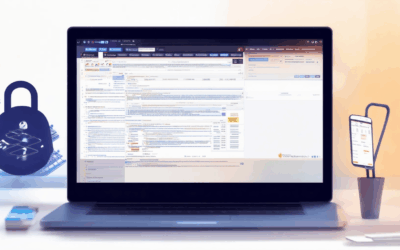In today’s interconnected world, our online activities leave a digital trail that can be both beneficial and risky. As we browse the internet, we generate vast amounts of data, from the websites we visit to the searches we conduct. This data privacy for browsing is crucial because it determines how much of our personal information is exposed and who has access to it. Whether you’re shopping online, managing your bank accounts, or interacting on social media, understanding and protecting your data privacy for browsing is essential to safeguarding your identity and ensuring your online activities remain secure. However, achieving this isn’t always straightforward, as modern technologies often come with hidden costs to your privacy. From tracking cookies to third-party trackers, there are numerous challenges that can compromise your data. But there are effective strategies to enhance your data privacy for browsing, such as using HTTPS, installing antivirus software, and configuring your browser settings. By taking proactive steps, you can minimize the risks and enjoy a safer browsing experience. In this article, we’ll explore how you can ensure data privacy for browsing, understand its significance, and discover practical tools and settings to protect yourself online.
Key Takeaways
- Block Cookies: Adjust your browser settings to block or delete cookies and use tools like BlindBrowser for comprehensive cookie management.
- Use a VPN: Install a VPN like ExpressVPN to create a secure tunnel and enhance your online privacy.
- Enable HTTPS: Always use secure connections indicated by the padlock icon and consider platforms like DuckDuckGo.
- Encrypted Messaging: Use apps like Signal or WhatsApp with end-to-end encryption, as recommended by BlindBrowser.
- Limit Permissions: Carefully review website permission requests to protect your data, advised by ProPrivacy.
- Try Privacy-Focused Tools: Utilize search engines like DuckDuckGo and explore resources from BlindBrowser for ad-blocking and tracker avoidance.
- Stay Informed: Regularly update yourself on cybersecurity threats through reputable sources, such as BlindBrowser.

Ensuring Data Privacy While Browsing Online
Protecting your data privacy while browsing online is essential in today’s digital age. Here are some practical steps you can take to enhance your online privacy:
- Use HTTPS: Look for websites that use HTTPS (the secure version of HTTP) to ensure your connection is encrypted. Check for a padlock icon in your browser or a green/yellow status indicator.
- Consider a VPN: A Virtual Private Network (VPN) can hide your IP address and protect your online activities. Research reputable VPNs and choose one that aligns with your needs and budget. Free options may be available, but ensure they are trustworthy.
- Use Ad Blockers Wisely: Install an ad blocker to reduce intrusive ads and pop-ups. However, be aware that some sites rely on ads for revenue. Test a few options to find a balance between privacy and support for content creators.
- Enable Encrypted DNS: Configure your device or router to use encrypted DNS services like Cloudflare or Google. This adds an extra layer of security for domain name resolution.
- Utilize Private Browsing Modes: Use incognito or private browsing modes to prevent saving history and cookies. While this doesn’t stop tracking, it controls what’s stored locally on your device.
- Install Privacy Extensions: Add browser extensions that block trackers and enhance privacy. Look for lightweight options that don’t slow down your browser and check for compatibility with your preferred browser.
- Choose Privacy-Focused Browsers: Consider using browsers like Brave or Firefox with built-in privacy features. Compare these with Chrome to determine which suits your needs best.
- Mindful Online Sharing: Avoid sharing unnecessary personal information online. Use strong, unique passwords for each account and enable two-factor authentication (2FA) wherever possible to add an extra security layer.
- Avoid Public Wi-Fi Without Encryption: Secure your internet usage on public networks by using a VPN, as many public Wi-Fi spots are unsecured and prone to eavesdropping.
By following these steps, you can significantly enhance your online privacy and protect your data from unauthorized access.
Data Privacy and Online Browsing Explained
Data privacy refers to the measures taken to protect individuals’ personal information from unauthorized access, misuse, or disclosure while browsing online. It ensures that your data remains confidential and secure during your internet activities.
Key Aspects of Data Privacy
- Personal Data: Information that can identify you, such as your IP address, cookies, browsing history, and device details.
- Third-Party Trackers: Companies that collect data about your online activity to target ads or analyze behavior, often without your consent.
- Risks Involved: Identity theft, fraud, and unauthorized access to sensitive information.
The Importance of Data Privacy
Data privacy is crucial because it safeguards your financial information, passwords, and other sensitive details. Without proper protection, these can be exploited by malicious actors, leading to significant harm.
Legal and Regulatory Framework
Many countries have implemented laws to protect consumer data, such as the General Data Protection Regulation (GDPR) in Europe and the California Consumer Privacy Act (CCPA) in the U.S. These regulations empower users to control their data and hold companies accountable for breaches.
Best Practices for Enhancing Online Privacy
- Use Privacy-Focused Browsers: Tools like BlindBrowser offer robust features to block trackers and enhance anonymity.
- Enable Do Not Track: Most browsers allow you to opt out of tracking cookies, reducing data collection.
- Be Cautious with Personal Devices: Avoid using personal devices for sensitive transactions and log out of accounts when not in use.
- Research Websites Before Browsing: Check the privacy policies of platforms before sharing personal information.
Competitors and Alternatives
There are several tools available to enhance your online privacy, including uBlock Origin and Brave Browser . While these options may vary in approach, they share the common goal of protecting user data.
Conclusion
Data privacy is essential for maintaining trust in online interactions. By understanding the risks and taking proactive steps, you can enjoy a safer and more secure browsing experience. Always stay informed about your data rights and the tools available to protect yourself.

Measures to Improve Data Privacy While Browsing Online
Protecting your data while browsing online requires a combination of strategies, tools, and awareness. Here are some effective measures:
- Use a Virtual Private Network (VPN): A VPN encrypts your internet traffic, making it difficult for third parties to track your online activities. Choose reputable providers like NordVPN or ExpressVPN for reliable service.
- Enable HTTPS: Look for websites with the HTTPS padlock symbol in your browser. This encrypts data between your browser and the website, enhancing security.
- Utilize Incognito or Private Browsing Modes: These modes prevent saving browsing history and cookies, reducing the risk of trackers accessing your data.
- Manage Cookies: Configure your browser to block third-party cookies, which helps limit tracking. Be aware that disabling all cookies may affect website functionality.
- Enable Encrypted Communication Protocols: Use TLS 1.3 or higher for secure connections, ensuring data remains confidential during transmission.
- Install Ad Blockers: Ad blockers can reduce tracking by blocking scripts from ads, though be cautious of their impact on website experiences.
- Use DNS-over-HTTPS: Secure your DNS queries with services like Cloudflare or Google Public DNS to prevent surveillance.
- Consider Privacy-Focused Browsers: Browsers like Brave come with built-in tracker blocking and ad blocker features, enhancing privacy by default.

What Steps Can I Take to Ensure Better Data Privacy While Browsing Online?
To enhance your data privacy while browsing online, consider implementing the following strategies:
- Block Cookies**: Adjust your browser settings to block or delete cookies, reducing tracking from websites. Consider using tools like BlindBrowser for comprehensive cookie management.
- Use a VPN**: Install a VPN to create a secure tunnel, enhancing privacy and making it harder for others to track your activities. Check out reputable services like ExpressVPN for reliable protection.
- Enable HTTPS**: Look for secure connections (indicated by the padlock icon) to encrypt your data during transmission. This is a fundamental step supported by platforms like DuckDuckGo .
- Use Encrypted Messaging**: Employ apps like Signal or WhatsApp with end-to-end encryption to keep communications private. These tools are recommended by privacy-focused platforms such as BlindBrowser .
- Limit Permissions**: Be cautious when granting website permissions; review requests before agreeing. This practice is essential for protecting your data, as advised by experts at ProPrivacy .
- Try Privacy-Focused Tools**: Use search engines like DuckDuckGo and avoid third-party trackers and ads. Explore resources from BlindBrowser to learn more about ad-blocking and tracker avoidance.
- Stay Informed**: Regularly update yourself on cybersecurity threats through reputable sources to protect against evolving risks. Platforms like BlindBrowser offer guides on staying informed about online privacy.
By integrating these measures, you enhance your online privacy effectively. Remember to stay vigilant and adapt to new threats as they emerge.
Tools and Settings for Enhanced Online Data Privacy
- Virtual Private Networks (VPNs) : We recommend using VPNs like BlindBrowser’s VPN service to mask your IP address and encrypt your internet traffic. This ensures your online activities remain anonymous and secure.
- Enable HTTPS : Always ensure websites you visit use HTTPS (the padlock icon in your browser) to encrypt data between you and the website. This prevents potential eavesdropping on public Wi-Fi networks.
- Ad Blockers : Install reputable ad blockers like uBlock Origin or AdGuard to reduce tracking cookies and intrusive ads. These tools help minimize data collection by third parties.
- Private Browsing Modes : Utilize browsers’ private or incognito modes to limit cookie storage and history tracking. However, note that these modes don’t always prevent tracking by persistent cookies.
- Data Encryption : Use encrypted communication platforms like BlindBrowser’s encryption tools to protect sensitive information such as emails and messages.
- Disable Tracking Features : Adjust browser settings to disable features like location services, push notifications, and background data updates that can leak personal information.
- Regular Browser Updates : Keep your browser and installed apps updated to benefit from the latest security patches and fixes for vulnerabilities that could expose your data.
By implementing these tools and settings, you can significantly enhance your data privacy while browsing online. Explore more detailed guides and resources on BlindBrowser.com to further safeguard your digital presence.

Improving Data Privacy While Browsing Online
Protecting your online privacy is essential in today’s digital age. By using the right tools and settings, you can safeguard your personal information and browse securely. Here’s a guide to enhancing your data privacy:
Top Tools for Enhanced Privacy
- Virtual Private Networks (VPNs): A VPN encrypts your internet connection, masking your IP address and preventing third-party tracking. BlindBrowser.com recommends services like NordVPN or ExpressVPN for robust protection.
- HTTPS Everywhere: Enable HTTPS to ensure your connections are secure. This protocol encrypts data between your browser and the website, preventing unauthorized access.
- Tracker Blockers: Use ad-blockers or tracker-blocking extensions like uBlock Origin to prevent websites from tracking your online activity.
- Private Browsing Modes: Utilize features like Firefox’s Private Browsing or Chrome’s Incognito Mode to avoid saving history, cookies, and cache files.
Settings to Optimize Privacy
- Browser Settings: Enable privacy-first settings in your browser. For instance, disable location services, reduce tracking permissions, and clear cookies regularly.
- Cookie Policies: Adjust your cookie settings to restrict tracking cookies. Most browsers allow you to manage cookie preferences directly from the settings menu.
- Secure Search Engines: Switch to encrypted search engines like DuckDuckGo, which do not track your searches or usage patterns.
Additional Tips for Safer Browsing
- Use Privacy-Focused Browsers: BlindBrowser.com advocates for browsers like Brave or Tor, which prioritize privacy by default.
- Regular Audits: Periodically review your privacy settings and consider using tools like WHOISXML API for advanced identity protection.
- Be Cautious with Public Wi-Fi: Always use a VPN when connecting to public networks to prevent data interception.
Conclusion
By equipping yourself with the right tools and adjusting your browser settings, you can significantly enhance your online privacy. Remember to stay informed about emerging threats and update your security measures regularly. For further guidance, visit BlindBrowser.com and explore our comprehensive resources on internet security.




